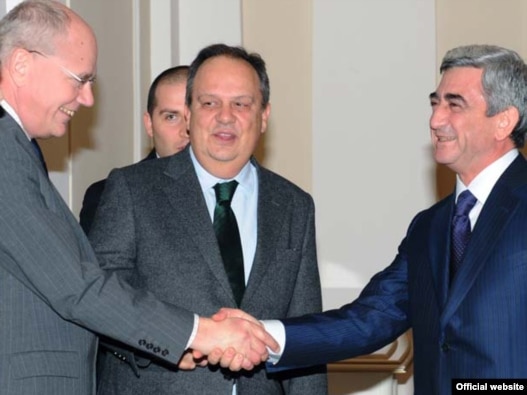(Reuters) – The foreign ministers of Turkey and Sweden condemned on Saturday a vote in the Swedish parliament that defined the early 20th-century killing of Armenians by Ottoman Turks as genocide.
Luke Baker
SAARISELKA, Finland Sat Mar 13, 2010

Swedish Foreign Minister Carl Bildt, who is holding informal talks with foreign ministers including Turkey’s Ahmet Davutoglu in northern Finland, said he was upset by the vote on Thursday and concerned it could affect Turkish-Armenian reconciliation.
“It’s regrettable because I think the politicization of history serves no useful purpose,” he told reporters.
“We are interested in the business of reconciliation, and decisions like that tend to raise tensions rather than lower tensions,” he said.
Sweden’s parliament, by a vote of 131-130, backed a resolution that branded the killing of up to 1.5 million Christian Armenians by Ottoman Turks as a genocide, a term that Turkey resolutely rejects.
Swedish Prime Minister Fredrik Reinfeldt phoned his Turkish counterpart, Tayyip Erdogan, on Saturday and said he disagreed with the resolution, according to a statement on the Turkish prime minister’s official website.
The vote followed a decision by a committee of the U.S. House of Representatives the week before approving a nonbinding measure condemning the 1915 killings.
In both cases Turkey responded angrily, withdrawing its ambassadors to Washington and Stockholm.
The vote in the Swedish parliament was particularly galling for Turkey as Sweden is one of Ankara’s strongest backers on issues such as Turkey’s desire to join the European Union.
Reinfeldt told Erdogan Sweden would continue to back Turkey’s EU bid and that the vote was driven by domestic politics and would not affect bilateral relations, the statement said. Erdogan canceled a planned visit to Sweden this month, and the government recalled its ambassador from Stockholm.
Davutoglu said Turkey would not stand by quietly if other nations took similar steps to describe the 1915 killings as a genocide and said it was pointless for countries to think they could put pressure on Turkey.
“We will not be silent and we will not just show the usual attitudes. For each case we will have a different (set of) measures,” he said.
“What is the purpose of this? If the purpose is to make pressure, nobody can make pressure on Turkey. if the purpose is to get local domestic concerns raised, Turkish historical events should not be misused for these narrow issues.”
Davutoglu, the architect of Turkey’s foreign policy of re-engaging with its neighbors, including Armenia, said it was wrong for parliaments to think they could define history purely via a vote.
He also said he was concerned about the impact the vote could have on efforts by Armenia and Turkey to reconcile their history and find a political common ground at a time when they are making progress toward normalizing relations.
(Editing by Matthew Jones)



 Armenia — President Serzh Sarkisian greets Goran Lennmarker (L), chairman of the Swedish parliament committee on foreign affairs, in Yerevan, 12 March 2010.
Armenia — President Serzh Sarkisian greets Goran Lennmarker (L), chairman of the Swedish parliament committee on foreign affairs, in Yerevan, 12 March 2010.

 Turkish Ambassador to Sweden Zergun Koruturk said Swedish lawmakers ”acted thinking that they were historians rather than parliamentarians, and it’s very, very unfortunate.”
Turkish Ambassador to Sweden Zergun Koruturk said Swedish lawmakers ”acted thinking that they were historians rather than parliamentarians, and it’s very, very unfortunate.”


